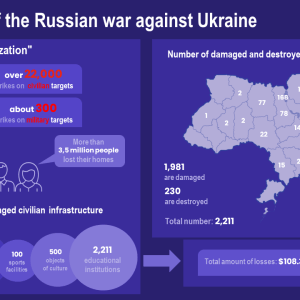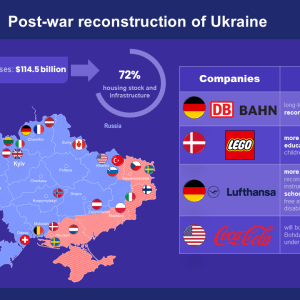677 KB
Russia’s full-scale war against Ukraine became the catalyst for transforming the global security system, which poses a huge challenge for the United States as a leading player in the international arena. The war itself, as well as everything that surrounds it, includes many paradoxical elements that have to be kept in mind during the systematizing process for coping mechanisms within the framework of U.S. foreign policy.
The United States of America is doing systematic and calculated work with foreign partners to stabilize global prices for energy supplies, weaken the Russian Federation, and tame the inflation rate. It is an interesting strategy – to slow the prices of oil and natural gas down, so Russia can earn less money to keep on going with the war. We can easily see the parallels with the Reagan policies when the USSR stepped into the Afghanistan war – the reduction of oil prices left the USSR with no resources to not only win but to continue its involvement in that war.
It is also worth mentioning that such an approach needs an in-depth calculation, as it involves many political actors with unexpected political stands, especially regarding the war against Ukraine. For example, most of the countries of the Gulf Coast region have not picked any side of the conflict publicly, which can lead to some surprising actions that may benefit the Russian interests in the war itself, with those countries simultaneously cooperating with the United States. Still, it is one of the most viable and important options on the table at the moment.

Gulf states have their own position regarding the Russian full-scale invasion of Ukraine. Both the government and population of those countries, especially in Morocco and the United Arab Emirates, gravitate more toward Russia. At first, it seems to be a sign of the post-Arab Spring crisis of democracy in the region, however, as it is always happening in the geopolitical quagmire of any kind, it is more than that. Gulf governments had been intensely looking toward the diversification of their foreign trade in recent years where Russia came very handy. As a result, they do not want to lose the gravity towards Russia both ideologically and financially, as it brings them more “independence” from the Western world. Many experts agree that the war in Syria has opened Pandora’s box as it has created the illusion where if Russia is determined to defend its position and status in the region, it will do so without any setbacks, sacrificing its last sacred resources. As the Middle Eastern governance style heavily incorporates inner sympathy for power and “multipolar vision”, it can find many dots connected with the current Russian vision for the geopolitical system. That mindset also has helped Russia to fill out the informational vacuum in the region that has pulled even the youngsters closer to the Kremlin’s sight. Decades of the U.S. military involvement without groundbreaking practical achievements (even though they were more productive than the Russian destructive strategy of “destroying everything with promises to rebuild it” without any particular understanding or desire of doing that and the extreme level of infrastructural poverty in the suburbs of their own country) in the Middle East have resulted in total apathy to everything associated with the United States, including the vision of the world. It poses a big challenge not only for the U.S. policy- and decision-makers, but for minds around the globe in general.
To understand better how to deal with it further, let us break down the position of the Gulf countries on the war in Ukraine one by one.

Iraq. In a framework of the Arab League, Iraq voted for its statement on February 28, in which Russia has not been called responsible for the war in Ukraine. Iraq also abstained from the vote on condemning Russian aggression in Ukraine at the UN General Assembly, at the same time “expressing regret”. Iraq explained such a position by “the risk of terrorists capitalizing on polarizations within the international community” and its historical background. However, the initial take on the war inside of the different Iraqi political movements and population is quite diverse.
For example, the Hashd al-Shaabi (Popular Mobilization Forces) which include 40 mostly Shiite militias, do not hide their sympathy for Russia in that case, blaming Europe and U.S. for failed policies in Ukraine and calling Russia “not less bloody” than them. At the same time, Moqtada al-Sadr, the leader of the Sadrist movement that won the recent Iraqi parliamentary elections called the war “absolutely useless” and called “for a dialogue”. Later, he added that “the American policy” in Ukraine is the reason for the war. Iraq’s Kurdistan Region in the face of its leader, Nechirvan Barzani, supports the Turkish policy regarding the war and supports its mediation efforts. Even though the head of “DPR” Denis Pushylin expressed support for Kurdistan earlier, the region itself did not strengthen its ties with Russia. The Iraqi population is also divided – one side openly supports Russia, especially after the huge posters with writings “We support Russia” appeared at the military base Ahl al-Haq in Baghdad owned by the pro-Iran militia Asaib. Later they were taken off and it sparked a huge debate on the war itself on social media.
UAE. The government of the UAE is trying to walk a very fine line in its positioning regarding the war in Ukraine, balancing between Ukraine, Russia, and the United States. It changes its mind regarding the UN documents on the war, by voting for them or abstaining from the vote. The UAE presidential adviser Anwar Gargash said that the UAE “believes that taking sides would only lead to more violence” and that UAE will “encourage all parties to resort to diplomatic action”. UAE sees Russia as one of its key economical partners and does not want to get involved in matters that may “isolate” Russia.
Oman. Muscat’s reaction to the Russian invasion is not surprising – despite voting in favor of the UN Resolution condemning Russia, in May Russia’s Foreign Minister Lavrov visited Oman and talked there about how the Western sanctions against Russia will lead “to failure”. Since then, Oman called for “space for diplomatic engagement” and “a European solution”. In the opinion of its Minister of Foreign Affairs Sultan Haitham bin Tarik, picking a “You are with us or against us” attitude regarding the war in Ukraine “will not solve the problem”.

Kuwait. This state is more aligned with the West among the countries of the region than other ones in the context of the war in Ukraine. For example, Kuwait was the only Arab state that co-sponsored the UN Security Council resolution on Russian aggression against Ukraine in March. The foreign minister of the country openly supported Ukraine and declared the importance of defending Ukraine’s territorial integrity and sovereignty.
Qatar. Publicly, this country has expressed its “respect for Ukraine’s sovereignty”. However, Qatar is one of the few winners of this war – economically. Doha uses the war for its economic benefit. For example, it is expected for Qatar to become one of the new main importers of liquified natural gas to Europe, which will make an already rich country even richer. All of that comes in the background of a lack of actions regarding the conflict outside of statements.
Saudi Arabia. This country is also trying to perform a balancing act in its foreign policy regarding the war in Ukraine. Despite close communication with Volodymyr Zelenskyi, Saudi Arabia is still trying to maintain its economic ties with Russia. Yes, in the Saudi media landscape there are numerous materials on how the war challenges the current international system, however, it is not an obstacle for the government here to sign contracts about the weapons trade with Russia. Still, recently, Saudi Arabia played an important role in changing global oil prices after U.S. President Joe Biden’s visit.
Bahrain. Like most countries in the region, Bahrain picked a concept of “relative neutrality” and called “for diplomacy” to prevail. However, it is leaning more toward the Russian side of the story. The phone call between Bahrain’s King Hamad bin Isa al-Khalifa and Vladimir Putin confirms that.
The rise of prices for energy supplies is also seen as a ‘wake-up call’ for the use of green energy. It has to be taken seriously, as an impulse for new cooperation and new projects with other countries. This Green energy issue is also crucial for the diversification of the U.S. energy industry. It falls very well under the presidential plans of Joe Biden, and it has to be used to distance itself from the influence of Russia in the energy market. The United States has already started to renew its infrastructure as a step to solve one of the most painful issues for the country. By investing in green infrastructure, such as charging stations for electric cars, wind energy stations, solar panel systems, etc., the United States serves as an example of the country finally coming to a renewable energy era, moving ahead with new micromanagement challenges and better solutions for them.
The United States targets its efforts to restore its security and economic influence in the Middle East, at least to prevent China, Russian Federation, and Iran from strengthening their role in the region. It is critical for the Ukrainian success in the war with Russia not only because such actions help to diffuse Russian efforts and attention from the war against Ukraine to other parts of the world. There is a strong tendency for economic decline in China, Russia, and Iran, and intense actions in the Middle East will deepen the wound. Such a strategy can result in the weakening of the mentioned governments.
It is essential to highlight that the structure of regional security alliances and the security system as a whole are transforming in the Middle East and North Africa. The situation in Africa, where Russia is pushing a massive informational heatwave in order to replace the victory of Ukraine in the informational war in Western countries should be thoroughly monitored. Russian media outlets have filled out the informational vacuum kept by Gulf governments and shaped the way of discourse on the war in Ukraine. Russia is also trying to unite the countries “bullied by the West” but because of the U.S. counteraction, these countries are rather isolating themselves from the whole world which leads to multiple economic and reputation losses.
- In order to deal with the current energy crisis, the U.S. should keep on cutting Russia out of the global energy market by reducing energy resources prices.
- Working with the Gulf countries will help not only with countering Russian propaganda narratives in the region, but also it will be a huge step toward limiting EU dependence on Russian gas and oil.
- It is also important to work with the Gulf states in a political vector, pushing them away from a comfortable position of “neutrality” in the war. It also depends on efficient informational work in the region with high-quality reporting which may help to counter Russian propaganda. However, it may be more difficult because of censorship in Gulf countries. Still, there are some measures that can be imposed via social media.
Artur Koldomasov for TDC


